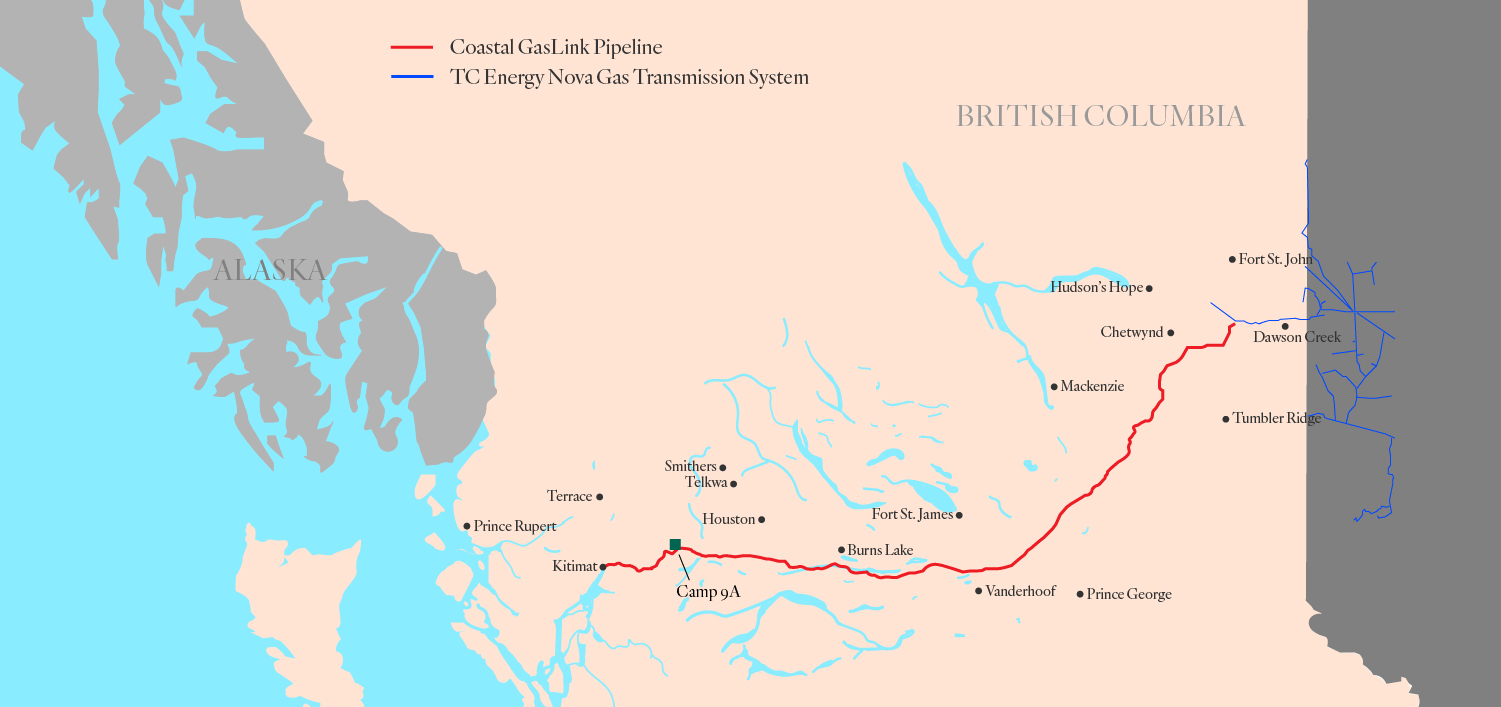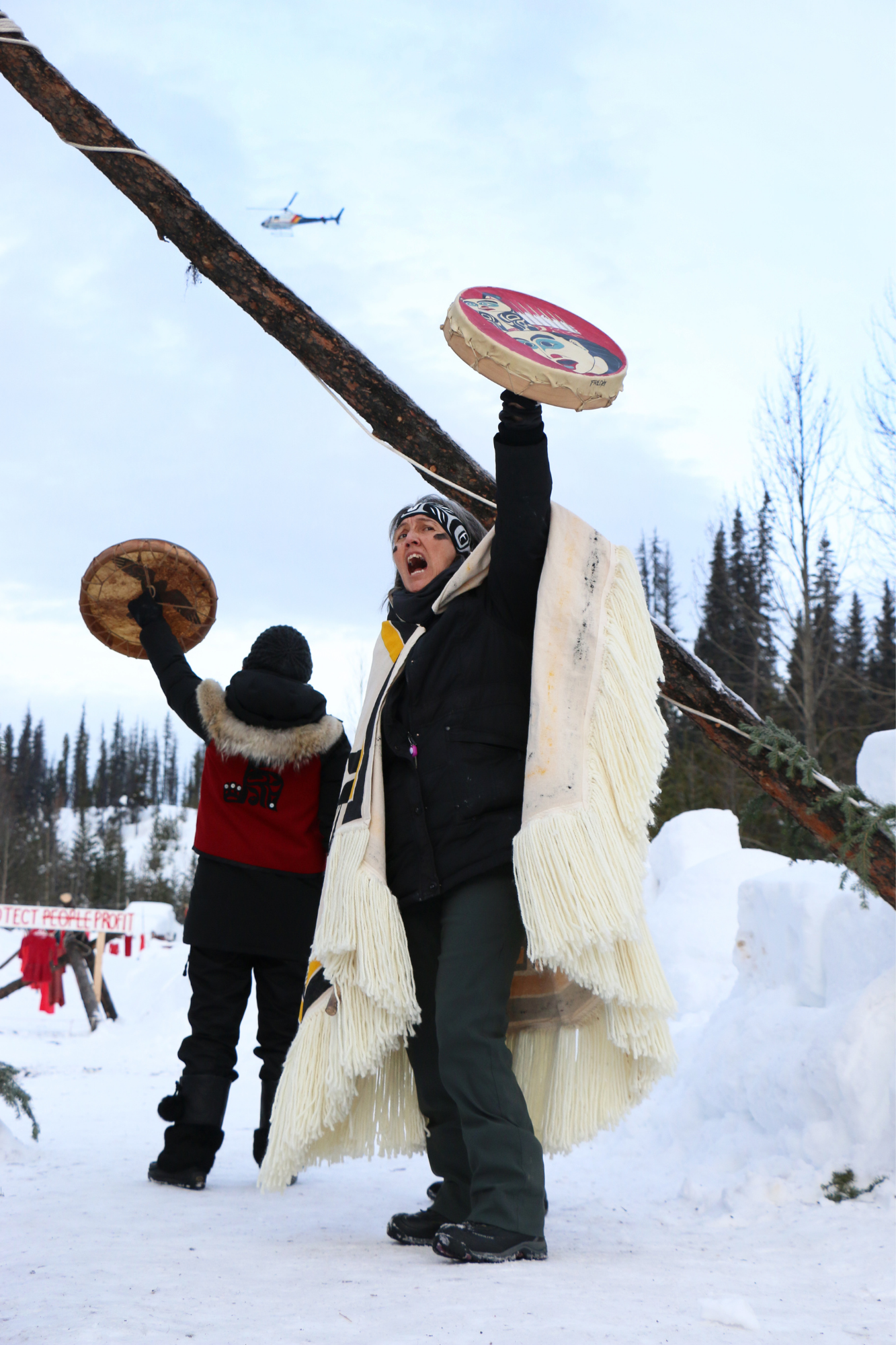Coastal GasLink Pipeline
Approximate location. By zooming in, you can recognize the Coastal GasLink pipeline corridor at a crossing of the Wedzin Kwa river.
Countless organizations have accused TC Energy’s fossil dreams of violating Indigenous people’s human rights and destroying their land.21454 The Canadian pipeline giant has built the 670 km (420 mi) Coastal GasLink Pipeline through the Yintah, the traditional lands of the Wet‘suwet‘en people in Western Canada. TC Energy never got full permission from the Wet‘suwet‘en to take their land and build a pipeline on it.
The company claims to have the support of local Indigenous communities, based on agreements reached with Wet’suwet’en elected band councils.21455 The hereditary Wet’suwet’en chiefs, however, continue to oppose the project.21456 The system of elected band councils was established by the Canadian government post-colonialization, whereas hereditary chiefs have been in charge since long before the settlers’ arrival.2145721458 Band councils do not even have jurisdiction over matters of land beyond their reserves.
TC Energy, formerly known as TransCanada Corporation, builds and operates pipelines all over North America.12315 Before the Coastal GasLink Pipeline, the energy company also wanted to build the controversial Keystone XL pipeline across Canada and the US. However, on his first day in office, President Biden cancelled TC Energy’s Keystone XL pipeline permit after more than 10 years of protests and legal battles. 14787
In Canada, TC Energy has just completed the Coastal GasLink Pipeline. The project has damaged ecosystems throughout its construction process. TC Energy has drilled under the Wedzin Kwa River to place the Coastal GasLink pipeline during spawning season, the riskiest time for salmon.15485 TC Energy has also cut down ancient forests to make space for the fossil corridor. It has torn apart the home of grizzly bears, black bears, deer, and the endangered Southern Mountain caribou.14789 Without a tree cover, the bare soil washed into the rivers, polluting the water and suffocating fish larvae.14791 Despite numerous warnings from environmental inspectors, the pipeline company continued to let soil wash into rivers and streams. Throughout the Coastal GasLink Pipeline's construction, TC Energy has received 59 warnings, 30 orders and fines of more than CAD 1.3 million for contamination and other environmental violations from the provincial environmental office.195431231715487 The company has even been fined for filing misleading reports to the provincial environmental office concerning its construction of the pipeline.15489

The Wet‘suwet‘en have a longstanding connection with the Yintah, their traditional lands. The Wet‘suwet‘en culture is centered around healthy forests, rivers, and animals. In the Yintah, the Wet‘suwet‘en people hunt, fish, and gather herbs and medicines. TC Energy has invaded their lands and lives. The company sent bulldozers to raze ancestral Wet‘suwet‘en burial sites to the ground.14793
TC Energy could not care less about indigenous rights. While the company claims to have the support of the indigenous Wet‘suwet‘en community along the pipeline route, their hereditary chiefs fiercely reject this.14795 Hereditary chiefs have been ruling over the traditional Wet‘suwet‘en lands since time immemorial.14797 They never ceded their land to the Canadian government and never gave their consent to have the Coastal GasLink pipeline built on it.14799 The hereditary chiefs are defending what has always belonged to them. But TC Energy’s security firm stopped Wet’suwet’en chief Na’moks from monitoring pipeline construction on his own territory.15491 TC Energy even got police support to arrest Indigenous leaders and their supporters for the ‘crime’ of being on their own land.14801
In November 2021, Canadian police raided a Wet’suwet’en camp for the third time in three years. The Wet’suwet’en and their supporters blocked access to a pipeline construction site on Wet’suwet’en territory to prevent drilling under the sacred Wedzin Kwa river. In response, the police arrived in military-style gear with assault rifles and arrested 30 people on Wet’suwet’en territory. Among them were land defenders, elders and journalists.14803 The repeated and escalating use of force against Wet’suwet’en land defenders by police and private security is finally being taken seriously by Canada’s government, with an official investigation being opened in mid-2023.19546 The Canadian government has to this day ignored calls to cancel the project, despite the United Nations Committee on the Elimination of Racial Discrimination's repeated requests to stop the Coastal Gaslink Pipeline, as long as the Wet’suwet’en disagree with the project.12321
TC Energy and its Coastal GasLink Pipeline have created an atmosphere of violence in the region. Hundreds of male workers moved into working camps to build the pipeline, their presence making Indigenous women in particular feel unsafe in their homes and on their land.1480519547 With police support, the company interrupted people’s traditional ceremonies.14807 Protestors have faced mounting abuse from police and pipeline proponents.19548 The Wet’suwet’en could not even find relief in their local healing center because of the pipeline construction noise. The healing center is a sacred space where they come together for traditional practices and to connect with nature. To the Wet’suwet’en, TC Energy’s pipeline project is an attack on their culture. The Wet’suwet’en have made clear before the United Nations Permanent Forum on Indigenous Issues that they consider this to be an act of genocide.[1] In June 2022, members of the Wet’suwet’en Nation launched a lawsuit against Coastal GasLink, the company’s security contractor Forsythe and the Canadian police to stop their harassing and intimidating behavior against Wet’suwet’en people.1232312325
The Coastal GasLink pipeline is the embodiment of a wrong path being taken and the dependencies created as a result. A central argument for supporters of the pipeline is the need to export Canadian-produced natural gas to markets in Asia. At Kitimat, where the pipeline ends, two LNG terminals with a combined estimated cost of USD 44 billion are being built up. Cedar LNG and Canada LNG are both planning expansions before having even started operations. Both are claiming to reduce global greenhouse gas emissions.1954919550 However, the pipeline will in fact be filled with Canadian gas extracted from fracking, one of the most environmentally damaging production processes. All this while Indigenous communities continue to accuse it of trespassing on their land.1955121459
Emboldened by the success of CGL’s construction and the support it obtained from authorities, the oil and gas industry continues its aggressive expansion in Canada. New pipeline projects are popping up in the region. The Prince Rupert Gas Transmission Pipeline (PRGTP), sold by TC Energy to the Ksi Lisims consortium in March 2024, is a clear example of this repeating trend.19552 Essentially running parallel to CGL, the PRGTP connects the Montney formation to Ksi Lisims, another LNG export terminal being built north of Kitimat.
Many people have stood up against TC Energy’s destructive pipeline and will continue to do so. In February and March 2020, thousands of people joined the Wet‘suwet‘en in their protest. They demonstrated and set up protest camps together. For weeks, they blocked Canadian railways to call attention to reported human rights violations by TC Energy.1549315495 Solidarity protests also erupted in response to TC Energy’s continued construction on Wet’suwet’en territory as well as the 2021 raids. Indigenous groups and more than 150 organizations from all over the world have called on banks to defund the Coastal GasLink Pipeline.12327 The Royal Bank of Canada, Bank of Montreal, Scotiabank, CIBC and TD Bank are among those who have pumped money into the project.12329 Activists are still drawing attention to Coastal GasLink’s rights violations. Now that the project is approaching completion, TC Energy is seeking CAD 7 billion more in financing to cover the pipeline’s costs – with many of the same banks facilitating the deal.19553 This would be the biggest corporate bond deal in Canada’s history, all to prop up a socially and environmentally abominable project.1955419555 The cost of the pipeline more than doubled from its initial estimate, but that didn’t stop its backers.19556 The global Wet’suwet’en solidarity network demands that financiers step away from TC Energy, a company that is making fossil fuel profits on the backs of Indigenous people. Their next aim is to stop TC Energy’s next disaster, the Prince Rupert Gas Pipeline.
Note: Reputational risk projects on GOGEL are updated annually. This article was last updated November 19 2024.

“Our people’s belief is that we are part of the land. The land is not separate from us. The land sustains us. And if we don’t take care of her, she won’t be able to sustain us, and we as a generation of people will die.”
Freda Huson, part of the indigenous peoples' protest and Right Livelihood Award Laureate.[2]
Groups working on Coastal GasLink: The Office of the Wet'suwet'en, Unist'ot'en Camp
Sources:
Freda Huson, spokesperson for the Unist’ot’en house group of the Wet’suwet’en people, delivered a speech before the United Nations Permanent Forum on Indigenous Issues. She stated: “They are trying to erase us from our own land. All these acts that continue are acts of genocide. They want to extinguish our rights to our lands.“ Her full speech is available at https://unistoten.camp/wetsuweten-leaders-condemn-canada-for-human-rights-violations-at-united-nations-forum/
The United Nations Genocide Convention of December 1948, which came into effect in January 1951, defines genocide in Article Two as "any of the following acts committed with the intent to destroy, in whole or in part, a national, ethnic, racial or religious group, as such":
- Killing members of the group;
- Causing serious bodily or mental harm to members of the group;
- Deliberately inflicting on the group conditions of life calculated to bring about its physical destruction in whole or in part;
- Imposing measures intended to prevent births within the group;
- Forcibly transferring children of the group to another group.